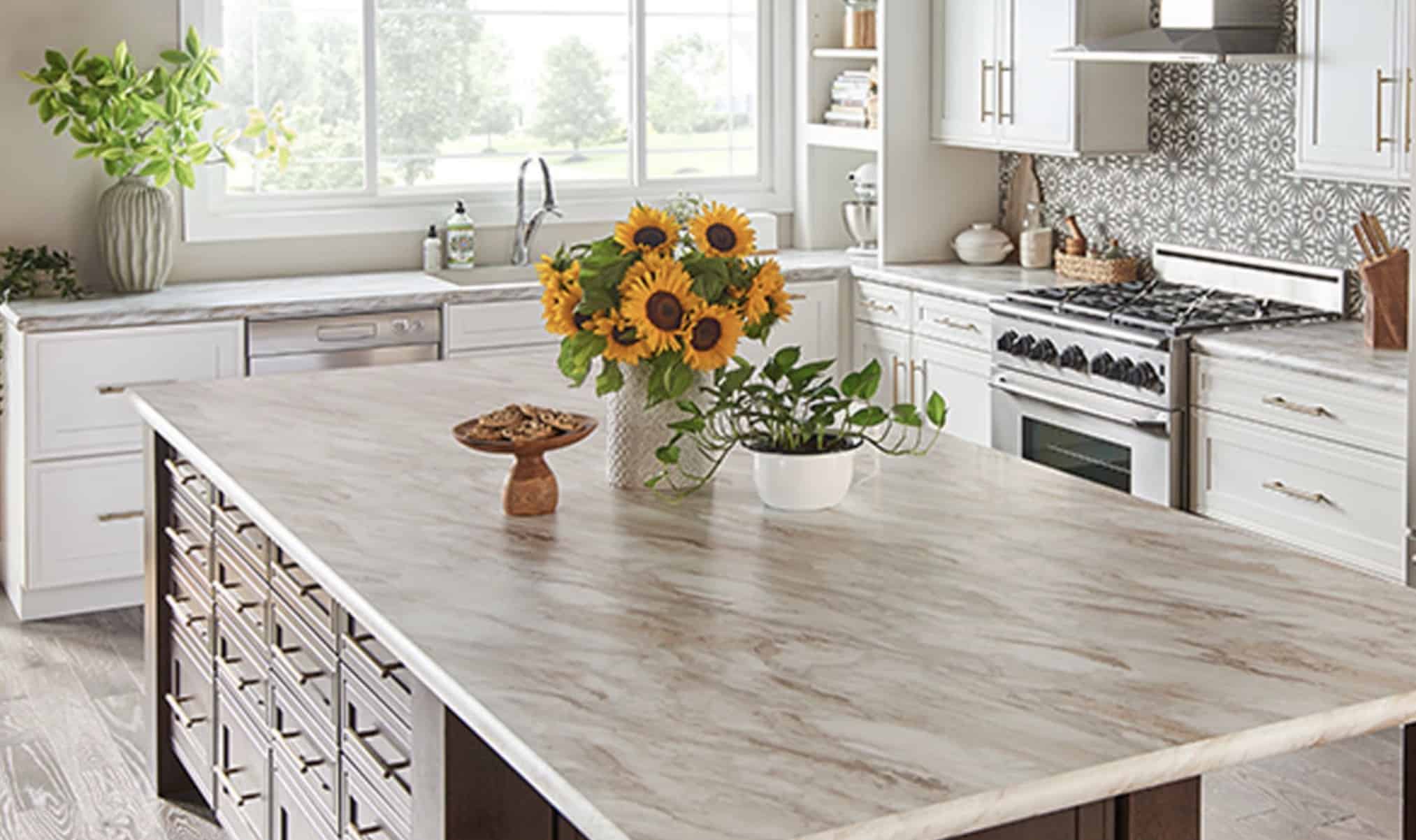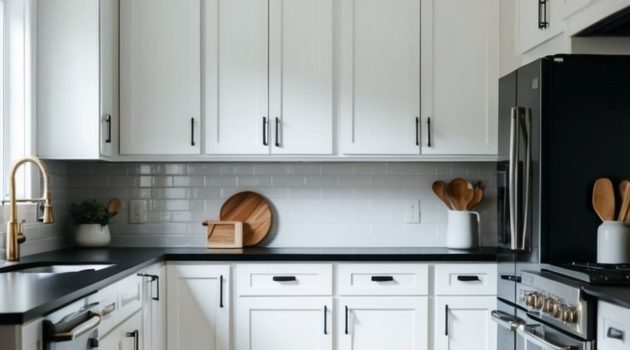When choosing the perfect countertops for your kitchen, you may feel overwhelmed by the variety of available materials.
Laminate countertops are a popular option that balances cost and aesthetics.
These versatile surfaces offer an attractive alternative to more expensive materials like quartz, granite, or marble and still provide a stylish and functional work surface.
This article will discuss the pros and cons of laminate countertops, helping you make an informed decision for your home.
1. Understanding Laminate Countertops
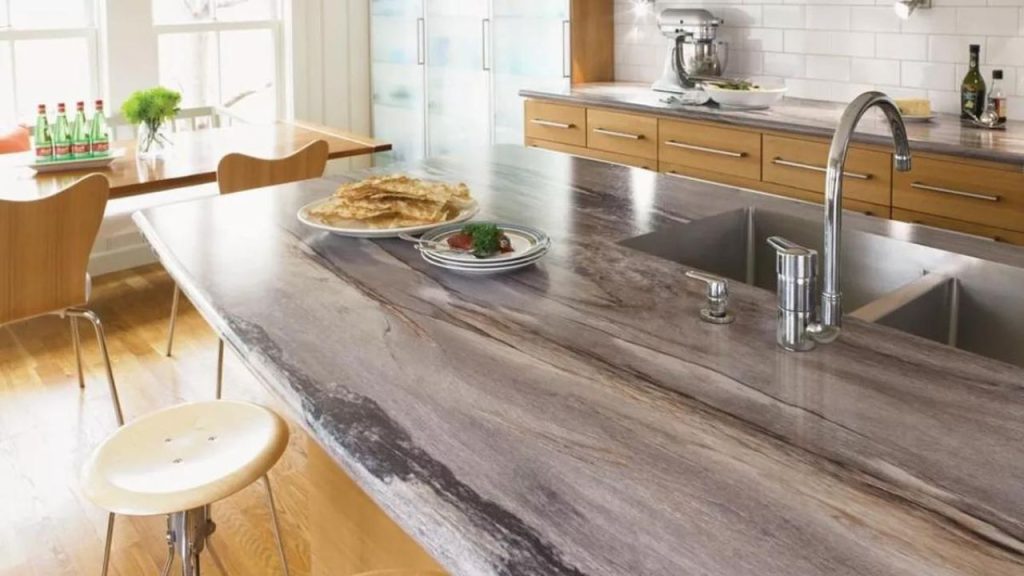
Laminates are made by stacking layers of paper and plastic resins, resulting in a durable and affordable material available in various colors and patterns.
Laminate countertops are primarily constructed from kraft paper soaked in plastic resins. These layers are combined with particleboard or wood, which serves as a sturdy substrate.
Manufacturing laminate countertops involves applying high pressure to the layers, resulting in a final product known as high-pressure laminates (HPL).
Brands like Formica are among the many options for laminate countertop materials.
When you opt for these countertops, choose an affordable and easy-to-maintain material.
They are highly versatile, allowing you to mimic the look of more expensive materials, like quartz, granite, or marble, at a fraction of the cost.
Plus, laminate countertops are DIY-friendly, making it possible to install them yourself and save even more money.
2. Pros of Laminate Countertops
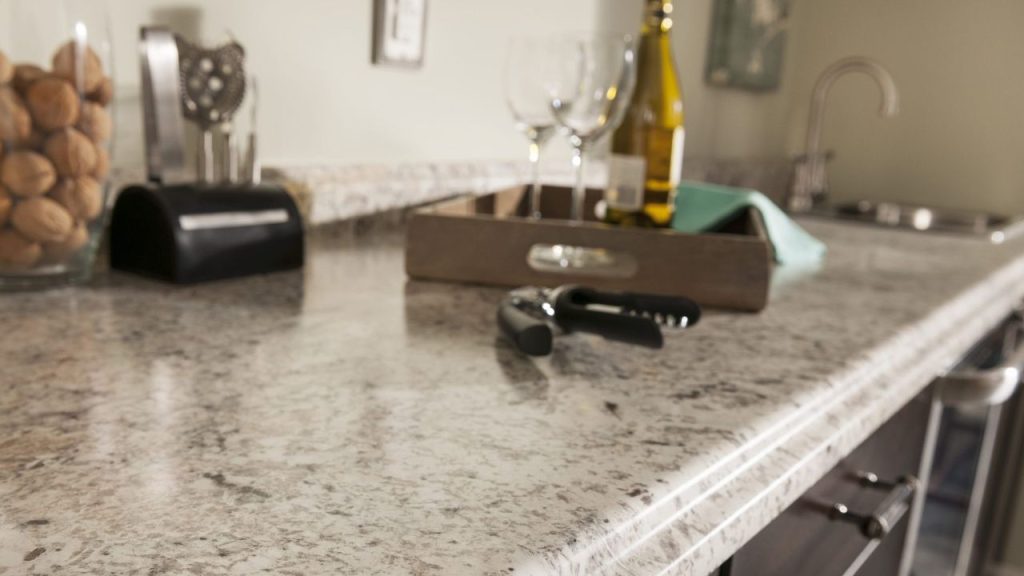
One of the biggest advantages of laminate countertops is their affordability.
Laminate is considerably cheaper than other materials like granite or quartz, making it an excellent option for budget-conscious renovators.
Don’t let the low price tag fool you; laminate countertops can still be durable and long-lasting when properly maintained.
Another benefit of laminate countertops is their lightweight nature.
Since they weigh less than their stone and solid surface counterparts, installation is much simpler, and you may even be able to handle it without professional help.
This can save you both time and money on labor costs.
In terms of design options, laminate countertops offer almost limitless possibilities.
With countless patterns, textures, and colors, you can find a laminate resembling natural stone or something unique and contemporary.
This versatility allows you to create a custom look that aligns with your design preferences.
Maintaining a laminate countertop is relatively easy, as they’re simple to clean.
Most spills and stains can be quickly wiped off with a damp cloth, and their non-porous surface prevents the growth of bacteria and mold.
For stubborn stains, a mild household cleaner will typically do the trick.
When it comes to durability, laminate countertops offer a stain-resistant surface that can withstand daily wear and tear.
They may be easier than some other countertop materials, but laminate countertops can provide years of reliable service with proper care.
3. Cons of Laminate Countertops
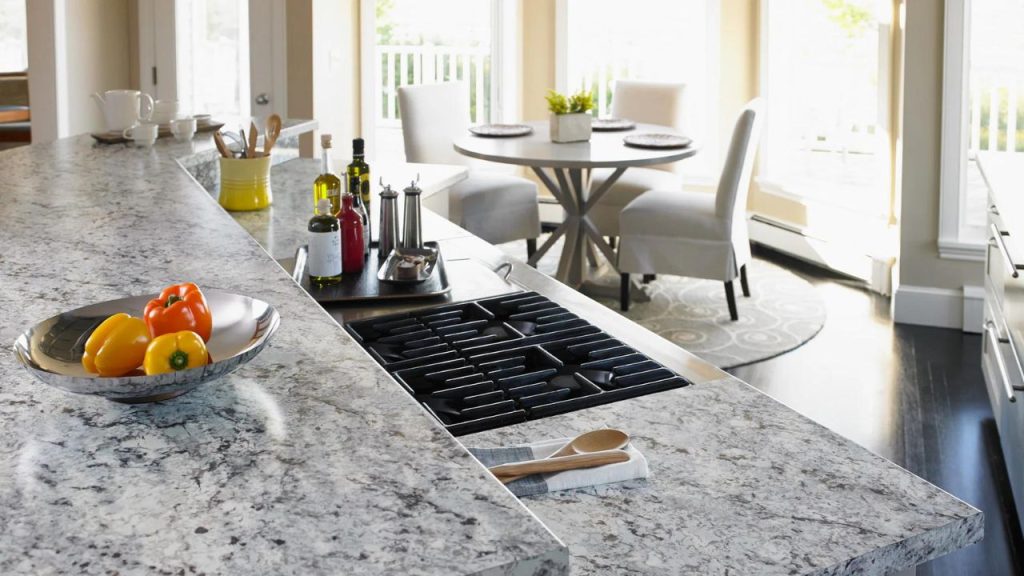
Laminate countertops might look attractive and be budget-friendly, but they come with their own set of drawbacks.
Before deciding to install these countertops in your home, it’s essential to weigh the cons alongside the pros.
One downside you’ll likely face is damage susceptibility. Unlike more rigid materials such as quartz or granite, laminate countertops are prone to scratches, stains, and chipping.
To prevent this, you must be cautious when using sharp objects and avoid placing hot items directly on the surface.
Despite your best efforts, sometimes accidents happen, and seams in laminate countertops can be a weak point.
The seams may be visible and prone to delamination under certain circumstances. This means the layers of the laminate can start to separate over time, potentially leading to warping.
Speaking of warping, heat damage is a genuine concern for your laminate countertops.
While they can withstand mild heat, prolonged exposure to high temperatures can cause the material to warp. Always use a trivet under hot pots and pans to protect the surface from heat damage.
Wear and fading are also common issues with laminate countertops. Over time, the vibrant colors and patterns might dull, leading to an uneven appearance.
This can be hard to repair and require a complete countertop replacement in severe cases.
Finally, consider the impact on resale value. Many homebuyers prefer homes with durable and long-lasting countertop materials, such as granite or quartz.
While laminate countertops are a budget-friendly option initially, they might contribute to your home’s resale value less than other materials.
So, consider how long you plan to live in your home and whether resale value is a concern before deciding.
4. Laminate Countertops vs. Other Materials
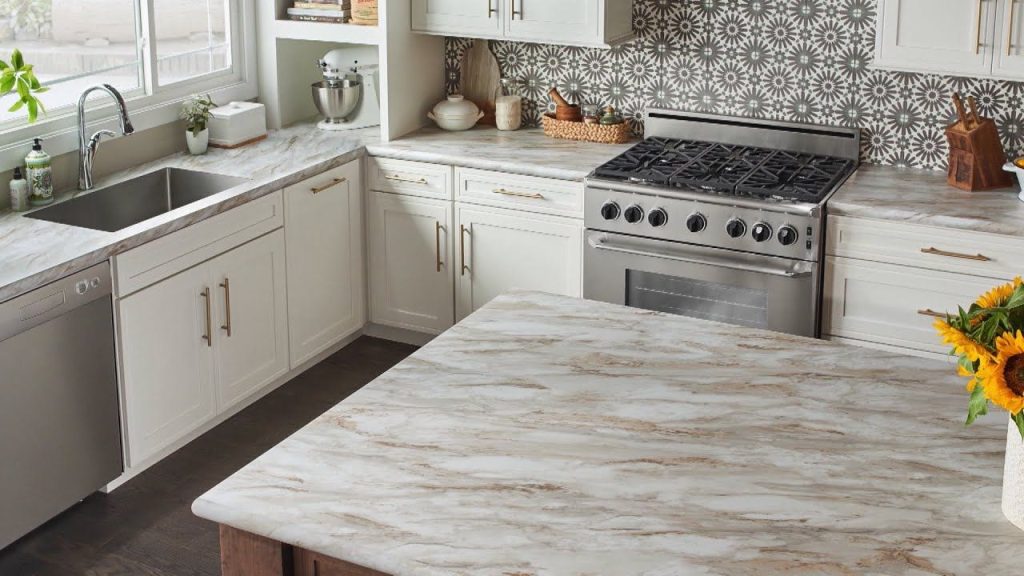
Formica vs Laminate Countertops
Formica is a brand that became synonymous with laminate countertops.
In reality, Formica is a high-pressure laminate (HPL) material, which is a more durable version of traditional laminate countertops. Both Formica and laminate share similar characteristics:
- Cost-effective: They’re both budget-friendly and more affordable than stone or solid surface countertops.
- Easy maintenance: Cleaning is a breeze—use a mild detergent and a cloth.
- Various designs: You can find various colors and styles, including imitation stone and wood.
Laminate vs. Quartz Countertops
Laminate and quartz countertops differ in several ways:
- Durability: Quartz is more resistant to scratches, stains, and heat than laminate. However, laminate countertops have a protective wear layer to withstand daily use.
- Aesthetics: Quartz’s more seamless and natural appearance resembles a genuine stone pattern. On the other hand, laminate offers design flexibility, imitating various materials, including stone.
- Pricing: Laminate is the more budget-friendly, while quartz is a high-end choice.
Granite vs. Laminate Countertops
Comparing granite and laminate countertops:
- Visual appeal: Granite countertops showcase the natural beauty and variations in the stone. Laminate has come a long way and can imitate granite, but it may need to be more authentic.
- Heat resistance: Granite can better withstand heat exposure without damage. Laminate might be susceptible to burns and delamination.
- Cost: Granite is more expensive than laminate, mostly due to the fact that it’s a natural stone material.
Marble vs Laminate Countertops
Differences between marble and laminate countertops:
- Elegance: Marble boasts a sophisticated, luxurious appeal that is hard to mimic. Although laminate countertops can resemble marble, they possess a different level of elegance.
- Maintenance: Laminate countertops are easier to maintain since they’re non-porous and more stain-resistant. Marble requires periodic sealing and is susceptible to etching from acidic substances.
- Price range: Laminate is more budget-friendly than marble at a higher price point.
Remember, when choosing countertops, consider your lifestyle, budget, and design preferences to make the best decision for your home.
5. Considerations for Buying Laminate Countertops
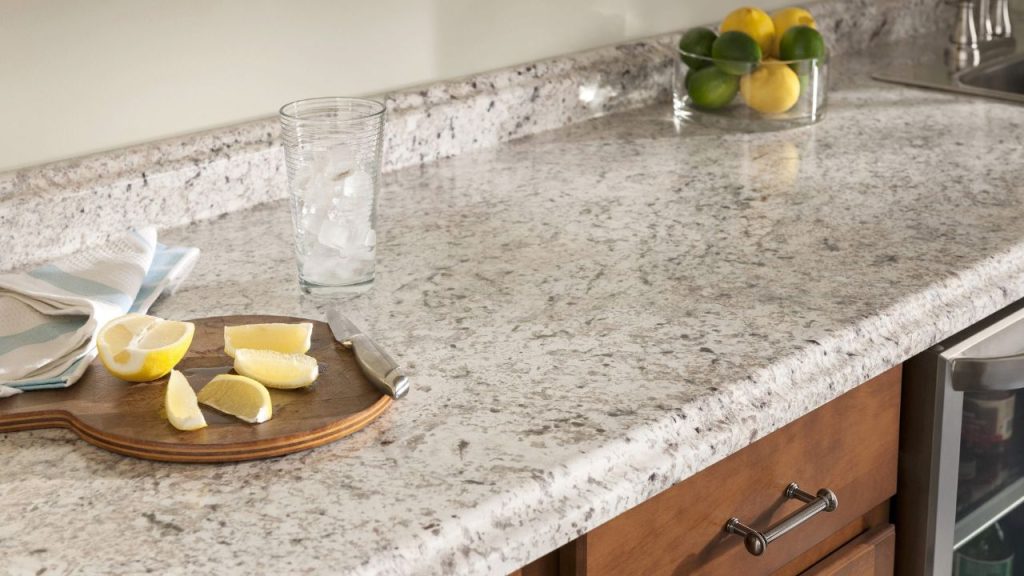
When considering laminate countertops for your kitchen, there are a few important factors to remember. Remember, this friendly guide is here to help you make an informed decision.
First and foremost, think about your budget. Laminate countertops are affordable and perfect for those looking to stretch their dollar.
Being budget-friendly means achieving a beautiful look for your space without breaking the bank. On average, laminate countertops cost significantly less per square foot than materials like quartz or granite.
With a wide range of color and design options, laminate countertops can resemble various materials, from quartz to granite and even marble.
This allows you to create a seamless look that aligns with your style and preferences.
However, laminate countertops might not contribute as much to your home’s resale value compared to other, more expensive countertop materials.
Buyers may perceive laminate as a less durable and less premium option.
While laminate countertops are generally easy to maintain and DIY-friendly, they have some drawbacks you should be aware of.
One downside is that they can be susceptible to burns, scratches, and delamination—especially when compared to more resilient materials like granite or quartz.
Additionally, laminate countertops have a shorter lifespan and can be difficult to repair. It’s crucial to weigh these factors against cost and design flexibility benefits.
In summary, when deciding if laminate countertops are right for you, consider their affordability, design versatility, maintenance requirements, and potential impact on resale value.
By considering these factors, you’ll be better equipped to make the best choice for your home and budget.
Frequently Asked Questions
What are the durability concerns with laminate countertops?
Laminate countertops are generally durable and can withstand everyday usage. However, they can be susceptible to burns and delamination over time. Remember that these countertops may have a shorter lifespan than other materials, and repairing them can be difficult.
How do laminate countertops compare to other materials?
Laminate countertops are more affordable and DIY-friendly than other materials like granite, quartz, and marble. They offer a variety of design options and are easy to maintain. However, they might not be as heat and scratch-resistant as some more expensive options.
Are laminate countertops resistant to heat and scratches?
Laminate countertops are less resistant to heat and scratches than other materials like quartz or granite. It’s essential to use trivets and cutting boards to protect your countertop from hot pots and pans and prevent scratches from cutting directly on the surface.
Can you get a high-end look with laminate countertops?
You can achieve a high-end look with laminate countertops due to their vast color and design options. Modern laminates can resemble materials like quartz, granite, and marble, allowing you to create a stylish and unique look in your kitchen or bathroom.
How cost-effective are laminate countertops?
Laminate countertops are very cost-effective compared to other countertop materials. They provide a versatile and durable surface at a fraction of the price of alternatives like quartz, granite, or marble.
What maintenance is required for laminate countertops?
Maintaining laminate countertops is relatively simple. Regularly clean the surface with a non-abrasive cloth and mild detergent, avoiding harsh chemicals that can damage the laminate. Additionally, take precautions to protect your countertop from heat and scratches to keep it looking new longer.
